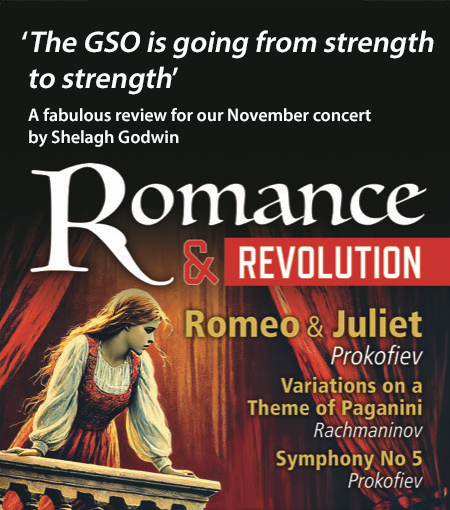A review of our 'wonderful' November concert

| Type of post: | Orchestra news item |
| Sub-type: | No sub-type |
| Posted By: | Andrew Turner |
| Status: | Current |
| Date Posted: | Mon, 25 Nov 2024 |
‘Romance and Revolution’ – a review by Shelagh Godwin
The Guildford Symphony Orchestra is going from strength to strength. On Saturday 23rd November at G-Live Guildford they presented a fascinating programme of Russian music under the title Romance and Revolution.
Romance entered the scene straight away, with an exuberant performance of excerpts from Prokofiev’s ballet suite Romeo and Juliet. Here the contribution of the woodwind and brass were very effective, and how many people listening to a recording of the final tragic movement actually hear that incisive piccolo note on the last chord?
Former soloist at the Una Clark Young Artists Concert in 2020, Cypriot-born Christos Fountos has gone on to make a name for himself (I should mention that the orchestra’s leader Simon Hewitt Jones is also a Young Artists competition winner). His performance of Rachmaninov’s Rhapsody on a Theme of Paganini bore this out. Beginning and ending cheekily, with just a few ‘plucked’ notes, the piece increases in intensity and then diminishes again just as quickly, notably to the romantic Eighteenth Variation in which the theme is turned upside down. The devilish implications behind the composer’s introduction of the Dies Irae theme were indeed striking. The pianism was nothing short of brilliant. But the subtleties of the orchestral score were well brought out by the orchestra under their charismatic conductor Darrell Davison.
Davison had much to contribute to the programme’s final piece, Prokofiev’s fifth symphony in which Christos Fountos performed the orchestral piano part with great aplomb. Drawing his inspiration from Shakespeare’s Henry V Davison connected the principal themes in the symphony with the five prospective members of Shakespeare’s ‘band of brothers’ each with his own striking character. I am not sure whether, without the score in front of me, I was able to navigate through Davison’s detailed exegesis, but it was a fascinating idea. Striking indeed was the exuberant brilliance of the ‘frontline’ second movement, the comparative peace of the lengthy third, and the relentless moto perpetuo of the finale which Davison compares to an image of a train moving inexorably towards the front line and annihilation of most of the band of brothers in the moment of victory. With Storm Bert raging outside, this was a wonderful way to spend the evening.
The Guildford Symphony Orchestra is going from strength to strength. On Saturday 23rd November at G-Live Guildford they presented a fascinating programme of Russian music under the title Romance and Revolution.
Romance entered the scene straight away, with an exuberant performance of excerpts from Prokofiev’s ballet suite Romeo and Juliet. Here the contribution of the woodwind and brass were very effective, and how many people listening to a recording of the final tragic movement actually hear that incisive piccolo note on the last chord?
Former soloist at the Una Clark Young Artists Concert in 2020, Cypriot-born Christos Fountos has gone on to make a name for himself (I should mention that the orchestra’s leader Simon Hewitt Jones is also a Young Artists competition winner). His performance of Rachmaninov’s Rhapsody on a Theme of Paganini bore this out. Beginning and ending cheekily, with just a few ‘plucked’ notes, the piece increases in intensity and then diminishes again just as quickly, notably to the romantic Eighteenth Variation in which the theme is turned upside down. The devilish implications behind the composer’s introduction of the Dies Irae theme were indeed striking. The pianism was nothing short of brilliant. But the subtleties of the orchestral score were well brought out by the orchestra under their charismatic conductor Darrell Davison.
Davison had much to contribute to the programme’s final piece, Prokofiev’s fifth symphony in which Christos Fountos performed the orchestral piano part with great aplomb. Drawing his inspiration from Shakespeare’s Henry V Davison connected the principal themes in the symphony with the five prospective members of Shakespeare’s ‘band of brothers’ each with his own striking character. I am not sure whether, without the score in front of me, I was able to navigate through Davison’s detailed exegesis, but it was a fascinating idea. Striking indeed was the exuberant brilliance of the ‘frontline’ second movement, the comparative peace of the lengthy third, and the relentless moto perpetuo of the finale which Davison compares to an image of a train moving inexorably towards the front line and annihilation of most of the band of brothers in the moment of victory. With Storm Bert raging outside, this was a wonderful way to spend the evening.



